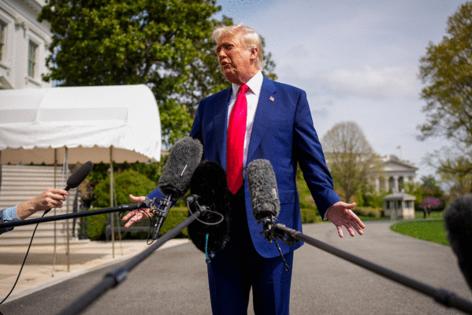Trump doubtful on another tariff pause, wants China concessions
Published in News & Features
WASHINGTON — President Donald Trump suggested another delay to his higher so-called “reciprocal” tariffs was unlikely, raising pressure on nations to negotiate trade deals with his administration.
Asked about the possibility of granting another 90-day pause, Trump cast that scenario as “unlikely,” while speaking to reporters aboard Air Force One on Friday. Trump also said that he would not drop tariffs on China, the world’s second largest economy, unless Beijing offers “something substantial” in return.
Trump said he believed financial markets were adjusting to his tariff policy, downplaying the volatility that has hit equity and bond markets this month after he announced plans to hit about 60 US trading partners with higher duties.
“When you look at what’s happening, I think so, yeah. I said there’d be a transition,” Trump said about the market reaction. “People haven’t understood it, now they are starting to understand it.”
Pressed on what concessions he’d like to see from Beijing, Trump said that he would like China to open its economy — but that he believed it was a non-starter so was not sure he would pursue it as part of the tariff talks.
“That would be great. That would be a big win. But I’m not even sure I’m going to ask for it, because they don’t want it open, they don’t want it open,” Trump said.
Friday saw a volatile session on Wall Street with stocks trimming most of the day’s advance as traders parsed the president’s conflicting signals about the progress he is making in tariff negotiations. The S&P 500 was still set for its longest winning run since January.
Trump in recent days has offered mixed messages about the status of talks with China, even as Beijing has denied that negotiations between the world’s two largest economies are taking place.
“We’re meeting with China. We’re doing fine with everybody,” Trump said in an interview with Time Magazine published earlier Friday.
But he also told Time he would not call President Xi Jinping if his Chinese counterpart does not call him first. Then Trump said such a call had occurred, without giving details.
“He’s called. And I don’t think that’s a sign of weakness on his behalf,” Trump said.
The U.S. president declined to answer when asked by reporters Friday when he spoke with Xi, saying, “I’ll let you know at the appropriate time. Let’s see if we can make a deal.”
Trump earlier this month announced sharp tariff increases on about 60 countries but then quickly paused those measures for three months to allow trading partners to negotiate deals, keeping in place a baseline 10% rate during the negotiating period. That set off a flurry of visits from foreign delegations eager to strike a deal, but Xi’s government has taken a more defiant stance.
In the Time interview, Trump also said he expected to wrap up trade deals with US partners “over the next three to four weeks.”
“I’ll be finished. Now, some countries may come back and ask for an adjustment, and I’ll consider that, but I’ll basically be, with great knowledge, setting — ready,” he added.
Trump told reporters later Friday at the White House that he is “getting along very well with Japan” and an agreement is “very close.”
Trump in the interview also pushed back on reports that Treasury Secretary Scott Bessent and Commerce Secretary Howard Lutnick convinced him to delay his reciprocal tariffs and said he “wasn’t worried” about the turmoil in bond and equity markets that greeted his higher duties.
“They didn’t tell me. I did that,” Trump said. “The bond market was getting the yips, but I wasn’t.”
_____
(With assistance from Magan Crane and Josh Wingrove.)
©2025 Bloomberg L.P. Visit bloomberg.com. Distributed by Tribune Content Agency, LLC.







Comments